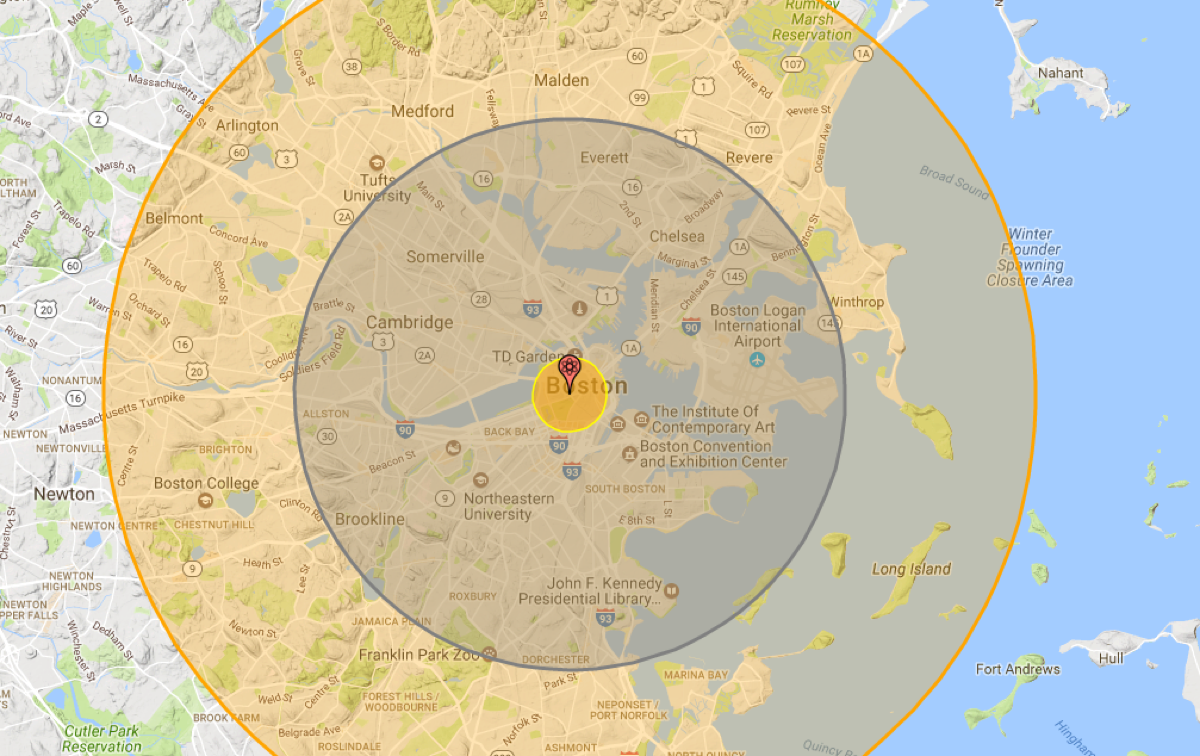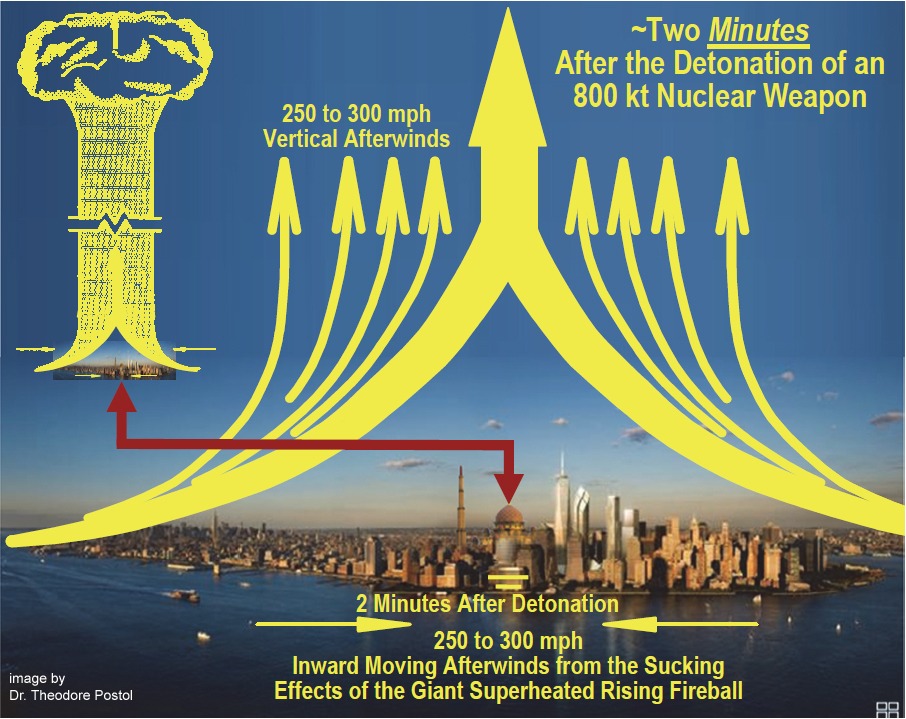How Far Can A Nuclear Bomb Travel
At the bottom of this page it says that eight small bombs might cover 160 sq miles of area ie 20 sq miles each whereas one single bomb eight times the size would only cover 80 sq miles. By default Nukemap assumed a 150-kiloton-yield warhead would explode 103 miles 165 km above the city.
 Nuke Map Explosion Nuclear Bomb Nuclear
Nuke Map Explosion Nuclear Bomb Nuclear
Nukes can travel at the speed of 13000 miles per hour and a distance of more or less 67000 yards away.

How far can a nuclear bomb travel. 3050 of total energy ionizing. The answer depends on a lot of things. This question asks how far you need to be from a nuclear weapon detonation to survive.
A gravity dropped nuclear bomb could fall several tens of thousands of feet from bomber to detonation. The most important issue is where the detonation takes place. If you want to know how far radioactive particles can travel heres the answer.
If a bomb is detonated. As far as the vehicle they are mounted on can go. A nuclear weapon can be carried by a B52 and flown around the world with aerial refuelling.
Intermediate-range ballistic missiles traveling between 30005500 kilometers approximately 1860-3410 miles. ICBMs can carry a nuclear warhead up to 12000 miles. North Korea claims that it tested a nuclear missile warhead on September 10.
On the other hand after doing some research they state nuke explosions can be seen from 600 miles distance but 600 miles gives a curve of 71km I dont think we can. The answer is yes some nukes can travel all over the World and can travel really far. The second factor is to do with the difference between a.
4050 of total energy thermal radiation. Once it explodes the nuclear fallout can travel as fast as 1000 radii. A nuclear weapon could be mounted on a Saturn V booster and sent to the moon.
How many miles can a missile travel. How Far Underground To Survive A Nuclear Blast. Intercontinental ballistic missiles ICBMs traveling more than 5500 kilometers.
An aerial detonation maximises a nuclear bombs destructive power since it allows the blasts energy to spread out. A ballistic missiles warhead could travel tens of thousands of miles from launch site to. The effects of a nuclear explosion on its immediate vicinity are typically much more destructive and multifaceted than those caused by conventional explosives.
To survive a nuclear blast you would need to be at least 3 feet deep underground. The strongest part of the blast thats fatal you can figure maybe one square mile depending on the terrain and how large the bomb is and whether it. I worry that this is still the case especially when I see so-called experts on television claiming that radiation cannot spread beyond 200 kilometers or 800 kilometers or whatever number they.
All the way to the Mariana Trench which at 10994 metres 36070 ft is the deepest natural trench in the world. The most modern nuclear weapon delivery systems the intercontinental and submarine-launched ballistic. In most cases the energy released from a nuclear weapon detonated within the lower atmosphere can be approximately divided into four basic categories.
Also important is the size yield of the nuclear weapon. This can travel hundreds of miles so in the aftermath of an attack even from a significant distance so Mr Salisbury recommends remaining inside for up to two weeks. For a bomb that size people up to 21 km 13 miles away would experience flash blindness on a clear day and people up to 85 km 528 miles away would be temporarily blinded on a clear night.
According to experts the warhead had an estimated explosive yield of 10 kilotonsabout half that of the bomb. With Earth curvature in mind 810km gives a 50km high curve. Heat is an issue for those closer to the blast.
Medium-range ballistic missiles traveling between 10003000 kilometers approximately 620-1860 miles. People who are in 80 to 120 radii and 180 to 220 radius can still survive but those who are within 270 radii up to 1000 radii will definitely die. The longer answer is it depends on the size and power of the nuclear bomb.
Also you need to be at least 36 inches of concrete or tightly-packed dirt to shield you from the blast radius. The wave of ionizing radiation emitted as a direct result of the nuclear blast would not travel that many miles from the blast depending on the size and altitude of the blast but certainly not to. So the earth is flat or the clip in the movie is full of crap.
 How Much Of Boston Would Be Destroyed By Nuclear War
How Much Of Boston Would Be Destroyed By Nuclear War
 Detonating A Thermonuclear Bomb Science In Depth Reporting On Science And Technology Dw 06 01 2016
Detonating A Thermonuclear Bomb Science In Depth Reporting On Science And Technology Dw 06 01 2016
 Elaborate Underground Architecture Of Soviet Metro Stations Photographed By Christopher Herwig Colossal Metro Station Underground Bomb Shelter Underground
Elaborate Underground Architecture Of Soviet Metro Stations Photographed By Christopher Herwig Colossal Metro Station Underground Bomb Shelter Underground
 5 Most Colossal Nuclear Explosions Ever Captured On Camera Nuclear Bomb Nuclear Mushroom Cloud
5 Most Colossal Nuclear Explosions Ever Captured On Camera Nuclear Bomb Nuclear Mushroom Cloud
 What Would Happen If Someone Dropped A Nuclear Bomb On Singapore
What Would Happen If Someone Dropped A Nuclear Bomb On Singapore
 Clay Lipsky Tech And Science Tips Reviews News And More Gizmodo Photo Atom Cool Photos
Clay Lipsky Tech And Science Tips Reviews News And More Gizmodo Photo Atom Cool Photos
 What Would Happen If An 800 Kiloton Nuclear Warhead Detonated Above Midtown Manhattan Bulletin Of The Atomic Scientists
What Would Happen If An 800 Kiloton Nuclear Warhead Detonated Above Midtown Manhattan Bulletin Of The Atomic Scientists
 Learn How To Survive A Nuclear Blast Through Television And Films Team Hack Life Survivalist S Nuclear Apocalypse Survival Skills Apocalypse Apocalypse Art
Learn How To Survive A Nuclear Blast Through Television And Films Team Hack Life Survivalist S Nuclear Apocalypse Survival Skills Apocalypse Apocalypse Art
 Here S What Would Happen If A Nuclear Bomb Hit Glasgow Glasgow Live
Here S What Would Happen If A Nuclear Bomb Hit Glasgow Glasgow Live
 Eve Of Destruction Doomsday Clock Hovers At 2 Minutes To Midnight Doomsday Clock Nuclear Bomb Atomic Bomb
Eve Of Destruction Doomsday Clock Hovers At 2 Minutes To Midnight Doomsday Clock Nuclear Bomb Atomic Bomb
 What Would Happen If Someone Dropped A Nuclear Bomb On Singapore
What Would Happen If Someone Dropped A Nuclear Bomb On Singapore
 Damage Zones After A Nuclear Detonation Idealized Map Radiation Emergency Medical Management
Damage Zones After A Nuclear Detonation Idealized Map Radiation Emergency Medical Management
 Pin On Governments Politics Democracy
Pin On Governments Politics Democracy
 Here S What Would Happen If A Nuclear Bomb Hit Glasgow Glasgow Live
Here S What Would Happen If A Nuclear Bomb Hit Glasgow Glasgow Live
 How To Survive A Nuclear Blast Shoulders Of Giants Castle Bravo Islands In The Pacific Ecuador Travel
How To Survive A Nuclear Blast Shoulders Of Giants Castle Bravo Islands In The Pacific Ecuador Travel



Komentar
Posting Komentar